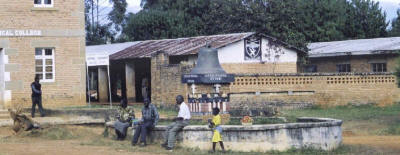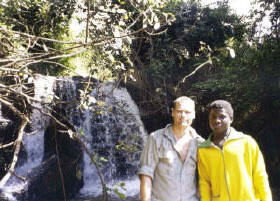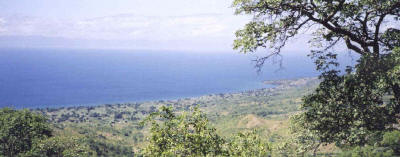
Tuesday, June 11 and Thursday, June 13
Chitimba: Florence Resthouse
Wednesday, June 12
Livingstonia: Lukwe Permaculture Camp
This part of the story starts with the bus ride from hell. While transport here is always slow, chancy, and crowded, the bus ride to Malawi was unbelievable. On Sunday, we had gone to the bus station in Mbeya to investigate busses to Malawi. We found out that there is a direct bus, but it didn't leave until Tuesday. Our only other option was to take a mini-van to the border, cross the border on foot, and then find onward transport in Malawi. We decided to wait until Tuesday, and we purchased tickets, complete with our seat numbers. The bus was scheduled to leave at 2:30 p.m. and was to arrive in Chitimba, our destination, around 11:00 p.m. The bus didn't leave from the main bus station, so they told us to come to the station "after lunch" on Tuesday, and then we'd go out to the junction to catch the bus.
On Tuesday, we show up at the bus station around 1:00. We tell the ticket agent (or someone who we think is the ticket agent) that we're waiting for the bus to Malawi. Around 2:00, the ticket agent tells us that he's received a call and the bus is "very close." One of the guys who's been hanging around the station takes charge of us. We walk about a mile to catch a dalla dalla. Apparently, it's lunchtime for all of the dalla dalla (mini-bus) drivers, and we wait around for a good half hour or so. Although we should know better by now, we're still not accustomed to African concepts of time; while we have begun to realize that relative words like near and far, later and soon, and even now, have different meanings in Africa than we're used to, we are pretty convinced that we're going to miss the bus. Finally, a dalla dalla arrives, and, accompanied by our friend from the bus station, we squeeze on, packs and all. We arrive at the "junction" just after 3:00 and find out that the bus has not yet arrived. Having been told that the bus was "nearby," we expected it to come relatively soon. Nonetheless, we settle in at the bus company shack, along with the rest of the people waiting for the bus. Around 5:30, the bus shows up, completely full . . . and then some.
I show the conductor our tickets with seat numbers clearly marked on them, and he tells us we have to sit on the floor until we get to the border. No problem -- we lay our packs in the center aisle and make ourselves comfortable. A couple of uneventful hours later, we arrive at the Tanzania-Malawi border. We line up outside a small building to clear Tanzanian immigration. When we finally get inside we see two men sitting behind a counter with four candles on it. For whatever reason, of all the buildings in the small compound, the immigration building is the only one (at least that night) without electricity. One of the men looks at our passports, hands them to the next man, he stamps them, and returns them to us. We walk across the border, hounded by money changers buying Tanzanian shillings and selling Malawian kwacha, and head for Malawi immigration. In addition showing our passports, for the first time ever, we have to produce our yellow fever vaccination certificates.
Meanwhile, outside, Malawian customs officials have taken every piece of luggage and cargo off the bus. They spend the next three hours or so checking through all of it, looking mostly for manufactured goods, computers in particular. Apparently, Malawi has no manufacturing to speak of and goods are often smuggled in to avoid paying duty. By now, it's dark. We sit on our luggage on the side of the road, and we meet three Canadians -- Paul, Nicole, and Priscilla -- who have recently climbed Kilimanjaro, taken a safari in the north, and visited Zanzibar. So at least we get some good travel advice while we're waiting.
As we reboard, I ask the conductor about our promised seats. He tells me to wait. The bus starts to fill up quickly, and we're getting very nervous. We park our bags smack in the middle of the aisle, spread ourselves out and take up as much space as possible. Miraculously, we get seats very quickly.
The bus fills up, and we add at least 20 more people (Randy counted), who had arrived at the border by dalla dallas that cannot cross into Malawi. Of course, each one had more cargo, and quite a few had chickens. Now, not only was every seat was full, but luggage and cargo were piled in the aisle as high as the tops of the seats, and people were crammed on top of the luggage. A claustrophobic's nightmare. After a few hours the girl who was perched on the back of the seat in front of us started to insist that I move over and share a seat with Randy so that she could have my seat. Needless to say, that didn't happen.
At about 2:30 am, we're told that we have to transfer to a local bus. I jump off to make sure the local bus waits, and Randy manages to wrestle our packs out from under the pile of luggage and people on top of them. We put the bags in the cargo bins on the new bus and climb on. Although we never would have thought it was possible, the new bus was was even more crowded. We stood in the steps to the door. I'm at the top of the steps pressed into a couple of local guys who stink of liquor. Randy's behind me and a couple more guys are hanging out the door behind him. The bus is so full that we're literally rocking side-to-side, and I am considering whether it would be better to be thrown out of the bus or into the rest of the passengers when we fall over. Luckily, after about 20 minutes, they tell us that we're in Chitimba. We climb out, look around, and see, literally, nothing. I ask the driver where “town” is. He looks at me funny and points across the road. We grab our stuff and head across the road. An old man is sleeping on the porch of a building; we ask him if we can camp nearby (actually, I do the international hand gesture for sleep -- hands together with my head resting on them -- and point toward the ground). He doesn't seem to care what we do.
We manage to pitch our tent and climb in, congratulating ourselves on deciding to bring the tent after all. We're not sure, however, exactly where we are -- on someone's property, a road, a parking lot, or a field. The first time a truck passes, we both sit up straight, convinced that the headlights are coming directly for us. Luckily, it passes by, and we realize that at least we're not on the main road.
Highpoint of the day: Arriving in Chitimba
Lowpoint of the day: Getting there
At sunrise, just a few hours later, we hear people walking around outside our tent. We're exhausted, but we figure we should get up and try to figure out where we are. Turns out that we're camped next to two adjoining guesthouses, and there's another right across the street. Randy takes down the tent, and I set out to evaluate our options for accommodation. After checking out the rooms, we decide we're better off camping outside and using the facilities, as they were, at the Florence Bay Resthouse. We decide to rest for the day, and head up to Livingstonia, on foot, the next morning. Because there have been reports of tourists getting robbed on the road up, Abi, the owner of the guesthouse, arranges for his 18 year old son, Mathias, to accompany us on the trip. Mathias, it turns out, is a sweet, friendly kid who speaks very little English. The little Swahili that we've learned is useless here. In Malawi, they speak Chichewa.
The guesthouse consists mainly of a dining room with some sleeping rooms behind. Out back, in a sort of courtyard area, the women prepare and cook food. Beyond the cooking area are two outhouses. We settle in, taking the wooden dining room chairs outside and just watching the day's activities. We spend some time trying to figure out who all the people are: Abi is the owner, we meet two of the sons -- Mathias and Him (pronounced Heem), a very bright 15 year old, and then there are a number of woman and small children. The main activity of the day is watching Abi and some of the other men build a kitchen. (Actually the other men were doing most of the building, and Abi did a lot of supervising.)
Abi offers us breakfast, and having missed dinner the night before, we're starving. We order tea, toast with tomatoes, and eggs. A little while later, one of the women shows up with the tea and toast, but no eggs. Abi very apologetically tells us that they looked everywhere, but could not find any eggs. That's when we realize the difficulties involved in keeping free-range chickens.
When the older kids come back from school, I take out the small polaroid camera and entertain them with pictures. Abi asks me to take a picture of him with his wives. All a sudden, the whole family arrangement starts to make a lot a more sense. It turns out that Abi has four wives (only two live here), and a total of 20 children ranging in age from 6 to 18.
Later on, when we go to the toilet, Him stops us, and very politely informs us that, in fact, only one of the two identical buildings an outhouse. The other is a shower. (That is, a building with a hole in the ground, where you stand and pour a bucket of water over your head.) We're pretty embarrassed; we had thought they had two toilets to accommodate the large family.
Faux Pas of the day: Shitting in the shower
After a walk to the lakeside, we come back and resume our position in the chairs. A pick-up pulls in and a white guy approaches us. He tells us that he heard that we wanted a ride up the hill. Amazing how news travels in a small place. He turns out to the owner of a camp outside of Livingstonia and he can give us a ride later on. We decide walking down from Livingstonia will be just as nice and decide to go up with him. There's only one passenger seat in the cab, so Randy sits in the back, along with a number of local people that we pick up on the way up, and bounces his way up the 20 switchbacks.
The camp (Lukwe Permaculture Camp) is beautiful. There are a number of permanent tents built into the side of the hill overlooking the lake. The view is best, though, when sitting on the composting toilet. Unfortunately, it's very cold; we had just brought enough for one night, and had left our packs, and warm clothes, with Abi. Although the camp is beautiful, we end up having a sort of strange night. Kevin, the owner, has several ex-pat friends visiting, and they're throwing a birthday party for one of them. Everyone is sitting around the fire having a few beers and waiting for dinner. Kevin, though, is pounding the vodka and OJ, and eventually is sick and falling down. Dinner is a long time in coming, and still exhausted from the night before, I give up and go to bed. Randy continued to wait, with Mathias, who'd come up with us. When dinner finally came, there was none for Mathias, and despite Randy offering to pay for his dinner, they still would not bring him a plate. Luckily we had some snacks with us, which we gave him to tide him over for the night. While the place was physically beautiful, we had a bad feeling about it, and were very ready to get up and go in the morning.
We paid, left, and walked the last three miles up to Livingstonia, realizing that we had made a very good decision in taking the ride up. Livingstonia is a bizarre little town: a small Scottish village transplanted to the top of an escarpment in Malawi, it sits 3000 feet above Lake Malawi. The town was built by Scottish missionaries in 1894 as a monument to David Livingstone. While primarily inhabited by Malawians now, the hospital, which is the oldest continuously operating in East Africa is still run by an old, white-haired Scottish doctor. We stopped for breakfast in town and had delicious scones -- the first baked goods we'd had in Africa. We visited the Stone House, originally the home of Dr. Laws, the settlement's founder, which has been converted into a small museum. We were particularly fascinated with the kinds of things that the missionaries actually brought over, and of course, had the Malawians bring up the hill including a piano, many hats and hat boxes, and several roll top desks.
Bargain of the day: breakfast -- five scones, two cups of tea, and a coke for about 75 cents
On the long, hot walk back down to Chitimba, we discovered that none of the small villages that we passed sold bottled water. On the positive side, we learned that several years ago the Malawian government built wells in most of the small villages, so the local people did not need bottled water. We finally found a small store selling water and tried to buy a couple of bottles. Unfortunately, as is very common in Malawi, the proprietor could not make change, so we could only buy one bottle with our small change, and rationed it among the three of us all the way down.
We reached Chitimba mid-afternoon, relaxed for a while on the beach, and then resumed our position in the dining room chairs. We spent a long time talking to Him (he speaks the best English of anyone in the household). He tells us that he had been chosen to attend a special secondary school in Livingstonia, but that after a month the family could no longer afford to send him there. As he tells us about month that he spent there -- the students from all over the country learning about each other, their customs, and the regions that they lived in; the teachers; the lessons -- the excitement in his voice is unbelievable, especially for a 15 year old boy. He's still in school (which is not compulsory at this age), and he shows us some of his textbooks, and wants to know what we think of them. We're overwhelmed by Him's potential and enthusiasm, but at the same time, we can so clearly see the obstacles that he'll have to overcome to achieve his dream of attending university in Lilongwe and medical school in Europe. The night before we leave Randy gives him a book on Sanford Fleming, the Canadian who first came up with the concept of time zones. Him spends rest of the evening sitting by a kerosene lamp poring over the book. Abi, his father, comes in, and thanks us over and over again for giving the boy the book.




